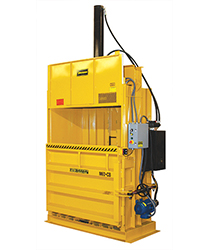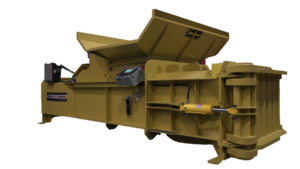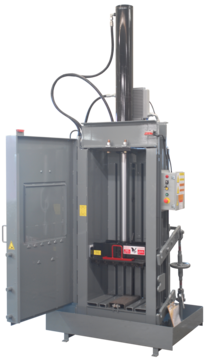Vertical, horizontal, & liquid extraction recycling balers!
From aluminum balers to plastic balers, paper balers, non-ferrous balers, scrap metal balers, aluminum can balers, PET balers, box balers, cardboard balers, industrial balers, newspaper balers, can crushers,& OCC balers, we have long lasting recycling balers in every size & configuration for your exact needs!
Our recycling machines are Made In The U.S.A. with quality U.S. steel, durable hydraulics, long lasting structural design, innovative PLC's, and have fast cycle times, front side ejection systems, and multiple safety features. These recycling equipment solutions are recognized around the world for their efficient operation and long lasting lifespan.
Select which type of baler you are looking for:
Recycling balers by Harmony!
Harmony’s industrial crushers consist of our quality vertical balers, horizontal balers, and liquid extraction balers. With recycling machines ranging from 30-72″ in size, you are ensured to get the right baling solution for your needs.
Save money and time on waste compaction – use our compactors for recycling to bale cardboard/OCC, PET, Aluminum, Plastic, Paper, Fiber, Textiles, Shrink Wrap, Non-Ferrous Metals, and more! Harmony Enterprises’ balers are reliable, affordable, and safe and easy to use.
Our wide range of recycling equipment solutions provide a variety of loading door dimensions and configurations, cycle times, ram force, motor sizes, electrical configurations, tying options, tippers, conveyors, and more.
If you’re not sure which recycling compactor or baler best fits your needs, visit our Products Page filter for more help or call us at (507) 886-6666.
You can also check out our Vertical Balers By Harmony page or our Cardboard Balers By Harmony page for useful guidance on which of our recycling balers you might need.
The correct recycling baler for your business will depend on the volume, throughput, operational space, electrical configuration, and feeding requirements for your recyclable materials.
Harmony’s Proven Process
When you buy or rent from Harmony Enterprises, we utilize our Proven Process to provide you with a wide range of innovative solutions, combined with a true partnership approach. Call us and let us help find the right recycling machine for your business. Save time, space, and money with a Harmony recycling baler today!
Our Core Values of being Committed, Passionate, Innovative, Enhancing Our Shared Experience, and having the Courage To Make A Difference all center around our Core Purpose of Career, Community, Culture and Company.
Harmony Enterprises lives these core values and is proud to have been named Family Owned Manufacturer of the Year by the Minneapolis-St. Paul Business Journal in 2020 and one of the Top Minnesota Manufacturers by beststartup.us in 2021.



